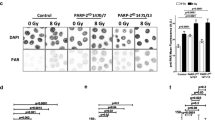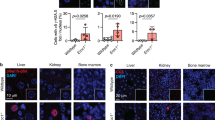Abstract
To elucidate the biological functions of poly(ADP-ribose) polymerase (PARP, [EC 2.4.2.30]) in DNA damage responses, genetic and biochemical approaches were undertaken. By disrupting exon 1 of the mouse PARP gene by a homologous recombination, PARP-deficient mouse embryonic stem (ES) cell lines and mice could be produced without demonstrating lethality. PARP-/- ES cells showed complete loss of PARP activity and increased sensitivity to γ-irradiation and an alkylating agents, indicating a physiological role for PARP in the response to DNA damage. p53, a key molecule in cellular DNA damage response, was found to stimulate PARP activity and became poly(ADP-ribosyl)ated in the presence of damaged DNA. However, PARP-/- ES cells showed p21 and Mdm-2 mRNA induction following γ-irradiation, indicating that PARP activity is not indispensable for p21 and Mdm-2 mRNA induction in the established p53-cascade. On the other hand, in a reconstituted reaction system, purified PARP from human placenta suppressed the pRB-phosphorylation activity in the presence of NAD and damaged DNA. Human PARP expressed in E. coli showed a similar effect on pRB-phosphorylation activity of cdk2. These findings suggest a direct involvement of PARP in the regulation of cdk activity for cell-cycle arrest.
Similar content being viewed by others
References
Sugimura T: Poly(adenosine diphosphate ribose). Prog Nucleic Acid Res Mol Biol 13: 127–1512, 1973
Durkacz, BW, Omidiji O, Gray DA, Shall S: (ADP-ribose)n participates in DNA excision repair. Nature 283: 593–596, 1980
Ding R, Pommier Y, Kang VH, Smulson M: Depletion of poly(ADPribose) polymerase by antisense RNA expression results in a delay in DNA strand break rejoining. J Biol Chem 267: 12804–12812, 1992
Satoh, MS, Lindahl T: Role of poly(ADP-ribose) formation in DNA repair. Nature 356: 356–358, 1992
Jacobson EL, Meadows R, Measel J: Cell cycle perturbations following DNA damage in the presence of ADP-ribosylation inhibitors. Carcinogenesis 6: 711–714, 1985
Nozaki T, Masutani M, Akagawa T, Sugimura T, Esumi H: Suppression of G1 arrest and enhancement of G2 arrest by inhibitors of poly(ADPribose) polymerase: Possible involvement of poly(ADP-ribosyl)ation in cell cycle arrest following γ-irradiation. Jpn J Cancer Res 85: 1094–1098, 1994
Masutani M, Nozaki T, Wakabayashi K, Sugimura T: Role of poly(ADP-ribose) polymerase in cell-cycle checkpoint mechanisms following g-irradiation. Biochimie 77: 462–465, 1995
Lazebik YA, Kaufmann SH, Desnoyers S, Poirier GG, Earnshow WC: Cleavage of poly(ADP-ribose) polymerase by a protease with properties like ICE. Nature 371: 346–347, 1994
Schreiber V, Hunting D, Trucco C, Gowans B, Grunwald D, de Murcia G: A dominant-negative mutant of human poly(ADP-ribose) polymerase affects cell recovery, apoptosis, and sister chromatid exchange following DNA damage. Proc Natl Acad Sci USA 92: 4753–4757, 1995
Watanabe S, Kai N, Yasuda M, Kohmura N, Sanbo M, Mishina M, Yagi T: Stable production of mutant mice from double gene converted ES cells with puromycin and neomycin. Biochem Biophys Res Commun 213: 130–137, 1995
Hartwell LH: Defects in a cell cycle checkpoint may be responsible for the genomic instability of cancer cells. Cell 71: 543–546, 1992
Kastan MB, Onyekwere O, Sidransky D, Vogelstein B, Craig RW: Participation of p53 protein in the cellular response to DNA damage. Cancer Res 51: 6304–6311, 1991
Wesierska-Gadek J, Schmid G, Cerni C: ADP-ribosylation of wild-type p53 in vitro: Binding of p53 protein to a specific p53 consensus sequence prevents its modification. Biochem Biophys Res Commun 224: 96–102, 1996
Wang ZQ, Auer B, Sting L, Berghammer H, Haidacher D, Schweiger M, Wanger EF: Mice lacking ADPRT and poly(ADP-ribosyl)ation develop normally but are susceptible to skin disease. Genes Dev 9: 509–520, 1995
de Murcia JM, Niedergang C, Trucco C, Ricoul M, Dutrillaux B, Mark M, Oliver FJ, Masson M, Dierich A, LeMeur M, Walztinger C, Chambon P, de Murcia G: Requirement of poly(ADP-ribose) polymerase in recovery from DNA damage in mice and in cells. Proc Natl Acad Sci USA 94: 7303–7307, 1997
Heller B, Wang ZQ, Wagner EF, Randons J, Bürkle A, Fehsel K, Burkart V, Kolb H: Inactivation of the poly(ADP-ribose) polymerase gene affects oxygen radical and nitric oxide toxicity in islet cells. J Biol Chem 270: 11176–11180, 1995
Scovassi AI, Franchi E, Isernia P, Brusamolino E, Stefanini M, Bertazzoni U: Activity gels of poly(ADP-ribose) polymerase: Phylogenetic studies and variations in human blood. In: F.R. Althaus, H. Hilz, S. Shall (eds). ADP-ribosylation of Proteins. Springer, Berlin, 1985, pp 111–115
Author information
Authors and Affiliations
Rights and permissions
About this article
Cite this article
Matsutani, M., Nozaki, T., Nishiyama, E. et al. Function of poly(ADP-ribose) polymerase in response to DNA damage: Gene-disruption study in mice. Mol Cell Biochem 193, 149–152 (1999). https://doi.org/10.1023/A:1006941016799
Issue Date:
DOI: https://doi.org/10.1023/A:1006941016799




